Regional Task Force on Agriculture Meets in Bishkek to Finalize the B5+1 Regional Business Agenda
On November 26, 2025, CIPE’s IBECA program convened the Regional Task Force on Agriculture in Bishkek to finalize the Regional Business Agenda for Agriculture, a key policy document which will be presented at the B5+1 Forum in February 2026. The meeting brought together 49 participants from Central Asia and the United States, including business associations, SMEs, chambers of commerce, research institutions, and international organizations.
Officials from the Ministry of Economy and Commerce of the Kyrgyz Republic and the U.S. Embassy opened the event by highlighting agriculture’s importance to regional growth and growing opportunities for U.S.–Central Asia cooperation. CIPE noted progress under the IBECA program and emphasized the need for stronger regional dialogue on trade, investment, and regulatory reform.
Participants reviewed trends in the U.S.–Central Asia agricultural market, opportunities for technology transfer and investment, and successful partnerships, such as expanded collaboration between Kyrgyz berry producers and U.S. research institutions following the 2024 B5+1 Forum.
CIPE presented the draft Regional Business Agenda, which focuses on three priorities:
- Digital supply chains and the development of a unified digital trade space
- Harmonized agricultural standards to support regional and international trade
- Export growth through improved quality, certification, and organic production
Participants worked in breakout groups to refine policy recommendations, contributing practical proposals on digitalization, standardization, laboratory development, certification, and regional cooperation.
CIPE closed by calling on Task Force members to remain engaged as the Agenda is finalized before the B5+1 Forum. The completed document will be shared with government delegations in January 2026.
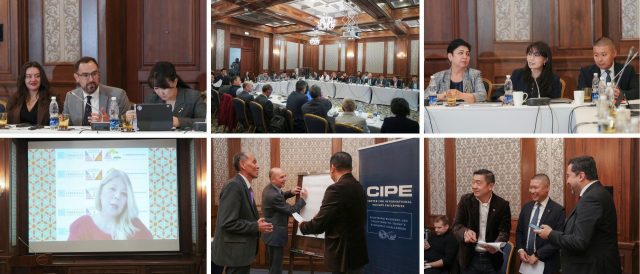
B5+1 Task Force Sets Priorities on Banking and Capital Markets

The Center for International Private Enterprise (CIPE) facilitated an in-person meeting of the B5+1 Regional Task Force on Financial and Banking Sector Development in Central Asia on September 22–23, 2025 in Guliston, Tajikistan. The meeting brought together 17 private sector representatives from Kazakhstan, the Kyrgyz Republic, Tajikistan, and Uzbekistan from across the banking and finance sector.
Task Force members agreed on three priorities to guide the sector’s forthcoming Regional Business Agenda:
- Digital Transformation
- International Integration
- Capital Markets and Investment Attraction
To ensure these priorities reflect the region’s most pressing needs, the Task Force also engaged with over 40 additional stakeholders from across Central Asia’s financial and banking sector throughout the week. These consultations provided critical feedback to validate and refine the proposed agenda.
After completing additional analysis and consultation, the Task Force will present the finalized Regional Business Agenda at the upcoming B5+1 Forum in Bishkek on February 4–5, 2026.
B5+1 Regional Task Force on Tourism Convenes in Dushanbe

On September 17–18, 2025, CIPE facilitated an in-person strategy session in Dushanbe, Tajikistan, for the B5+1 Regional Task Force on Tourism. The meeting brought together 17 private sector leaders from Kazakhstan, the Kyrgyz Republic, Tajikistan, and Uzbekistan to chart a joint vision for strengthening Central Asia’s tourism sector.
Over two days of discussions, task force members agreed on the foundation of a Regional Business Agenda built around three shared priorities:
- Expanding digital and physical infrastructure to support tourism growth
- Advancing unified marketing and regional brand development
- Investing in human capital, including mutual recognition of certifications and professional qualifications
On September 18, task force members also joined the International Tourism Exhibition – DITE 2025 in Dushanbe, where they presented their work under the B5+1 platform and engaged with the wider tourism sector, including more than 200 companies — 65 of them from Europe, Asia, and the Americas — to consult on shared priorities and challenges.

IBECA Launches Regional Task Force on Transport and Logistics
 On August 25, 2025, over 35 private sector leaders, business associations, and logistics experts from across Central Asia launched the Regional Task Force on Transport and Logistics under CIPE’s Improving Business Environment in Central Asia (IBECA) program. The initiative aims to harmonize regional approaches, advance policy reforms, and strengthen U.S.–Central Asia cooperation in a sector vital to trade and connectivity.
On August 25, 2025, over 35 private sector leaders, business associations, and logistics experts from across Central Asia launched the Regional Task Force on Transport and Logistics under CIPE’s Improving Business Environment in Central Asia (IBECA) program. The initiative aims to harmonize regional approaches, advance policy reforms, and strengthen U.S.–Central Asia cooperation in a sector vital to trade and connectivity.
Toward a Regional Agenda
The meeting consolidated national initiatives into a regional framework, with participants sharing challenges, reform successes, and policy priorities to inform recommendations for the B5+1 Forum in Bishkek on February 4–5, 2026.
Country Highlights
- Uzbekistan: Arsen Ayrapetyants (Association of Customs Brokers) reported CIPE-supported reforms reducing foreign trade contract types from 22 to 6, with ongoing work on debt rules and streamlined contracts.
- Kazakhstan: Assel Sadykova (Union of Road Carriers and Forwarders) flagged challenges including an outdated truck fleet and skills shortages. Pilot projects on electronic permits and leasing tools for fleet renewal are underway. CIPE-supported coordination among associations has strengthened national advocacy and engagement with international partners.
Regional Perspectives
- Natalia Andrievskaya (WiLAT) stressed the acute shortage of trained logistics professionals and called for workforce development as a top priority.
- Oksana Sorokina (7R Logistics CEO) highlighted the urgency of harmonizing transit regimes, updating training standards, and improving infrastructure at the China–Kazakhstan border, while proposing dual education systems and SME training on sanctions compliance.
- Jeff Elrich (AmCham Kazakhstan) outlined seven pressing priorities for international business, including customs valuation rules, border delays, and bottlenecks in Caspian ports.
- AmCham Kyrgyzstan flagged ongoing bureaucratic barriers despite EAEU membership.
- CargoDeal Uzbekistan raised concerns over inconsistent legislation at border crossings and called for regional alignment on fleet formation rules.
Linking Transport and E-Commerce
Speakers stressed logistics reforms as key to digital trade. Alua Korpbayeva (IBECA E-Commerce and IT Task Force) proposed regional logistics centers, harmonized regulations, and stronger business–government dialogue.
Next Steps
The Task Force will:
- Expand membership through an open invitation;
- Hold online consultations in September;
- Meet in Tashkent in October 2025 to finalize recommendations for the B5+1 Forum.
With strong engagement from industry leaders and momentum from IBECA’s first phase, the new Task Force will help transform fragmented national efforts into a unified regional strategy to boost growth, competitiveness, and deeper U.S.–Central Asia business ties.
Regional Agriculture Task Force Launched to Strengthen U.S.–Central Asia Cooperation within IBECA
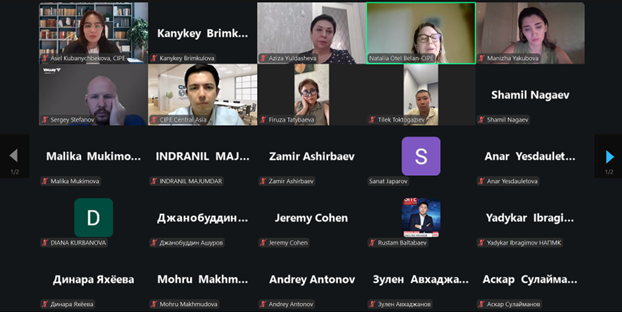
Stakeholders from across Central Asia and the United States convened virtually August 21, 2025 to launch the Regional Agriculture Task Force under the Improving Business Environment in Central Asia (IBECA) program. The new platform is designed to deepen regional cooperation, attract investment, and improve the overall business climate in agriculture, one of the region’s most promising sectors for growth.
Building a Stronger Dialogue
Participants emphasized that agriculture offers significant potential for regional economic development, particularly through closer engagement with U.S. partners. Discussions highlighted opportunities to strengthen private sector collaboration ahead of the next B5+1 Forum in Bishkek on February 4–5, 2026.
Survey Insights
Presenting the findings of a regional survey, IBECA expert Aziza Yuldasheva noted that half of surveyed companies already cooperate with the United States, mainly in training and education, agricultural exports and imports, and joint ventures. At the same time, companies identified barriers including limited market information, high logistics costs, restricted financing, strict certification requirements, and customs hurdles.
Reform Momentum
Country representatives also shared recent achievements supported by IBECA:
- Kyrgyz Republic: Amendments to the Tax Code reduced VAT on retail sales of agricultural products by 80%, while abolishing VAT on seedling imports lowered costs for farmers.
- Uzbekistan: Ongoing reforms have removed customs barriers, extended land lease terms, and advanced digitalization, creating more favorable conditions for investment.
Regional Priorities
Participants agreed on several strategic priorities for advancing agricultural cooperation:
- Deepening regional integration to expand export capacity;
- Attracting U.S. technologies and investment to boost productivity;
- Promoting harmonization of standards and certification;
- Developing logistics hubs and water-saving technologies.
While progress is evident, challenges such as high logistics costs, customs barriers, and limited access to irrigation and finance remain pressing concerns across the region.
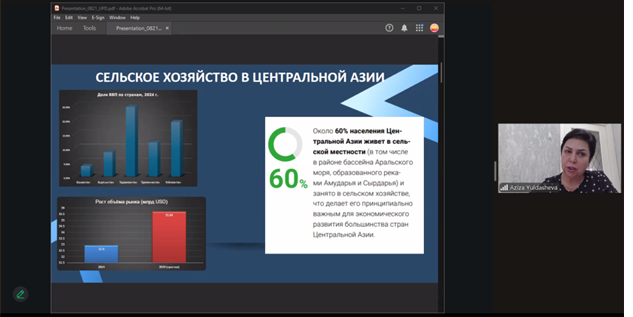
Next Steps
The Task Force will continue consultations with businesses to prepare a Regional Business Agenda for Agriculture, to be presented at its first in-person meeting on October 20, 2025. This agenda will guide future cooperation and shape joint policy recommendations to governments in Central Asia and the United States.
IBECA Launches Regional Taskforce on E-Commerce and IT
 On August 4, 2025, business leaders, policy experts, and tech partners from across Central Asia joined forces online to launch a new regional taskforce on e-commerce and information technology. Created under CIPE’s Improving Business Environment in Central Asia (IBECA) program, the taskforce will drive coordinated reforms, public-private dialogue, and faster digital growth across the region.
On August 4, 2025, business leaders, policy experts, and tech partners from across Central Asia joined forces online to launch a new regional taskforce on e-commerce and information technology. Created under CIPE’s Improving Business Environment in Central Asia (IBECA) program, the taskforce will drive coordinated reforms, public-private dialogue, and faster digital growth across the region.
The group brings together a cross-section of national e-commerce and IT associations, fintech leaders, logistics firms, civil society, academics, and top U.S. tech companies. Participants include representatives from Google, Meta, and Uber, alongside key organizations from Kazakhstan, Kyrgyzstan, Tajikistan, and Uzbekistan. CIPE is providing technical and coordination support through a multi-country team.
With IBECA entering its regional phase and the next B5+1 Forum set to take place in Bishkek, the taskforce marks a shift from fragmented national efforts to a more connected regional approach.
E-commerce in Central Asia is growing 30% annually but still only accounts for 15% of total trade. In 2022, turnover hit $14.7 billion, underscoring both momentum and untapped potential. Key priorities emerged: simplify seller onboarding, fix payment bottlenecks, harmonize tax and consumer laws, and invest in logistics and customs modernization.
Country-specific insights grounded the discussion:
- Kazakhstan: streamline marketplace registration, improve access to capital.
- Kyrgyzstan: enable regional marketplace registration, resolve PayPal issues, regain access to U.S. platforms.
- Uzbekistan: reopen cross-border payment channels, ease data-localization rules blocking services like Apple Pay and Google Pay.
Beyond e-commerce, the taskforce will also focus on tech innovation. Participants proposed forming a “Central Asian Alliance” to boost IT exports, build talent pipelines, strengthen cybersecurity, and attract venture finance. Key hubs like Astana Hub, Uzbekistan’s IT Park, and Kyrgyzstan’s HTP were spotlighted.
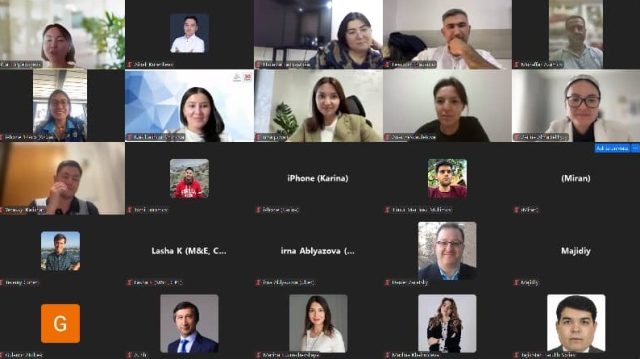
American partners urged regulatory modernization to reflect AI and cloud realities. Google proposed a regulatory subgroup, while Meta called for universal internet access and AI coordination, cautioning against overreaching data laws.
The group agreed to form two subgroups: (1) E-Commerce & Fintech and (2) IT & AI. A follow-up meeting will be held in Tashkent this October, with an online platform already launched to coordinate efforts.
With regional momentum and global partners at the table, the taskforce is set to turn strategy into action.
IBECA Tourism Task Force Launches Regional Cooperation Effort
The first meeting of the Regional Tourism Task Force marked a key step in advancing cooperation in Central Asia’s tourism sector.
Held under the IBECA program, the virtual meeting gathered 20 tourism experts, private sector representatives, and business associations from Kazakhstan, the Kyrgyz Republic, Tajikistan, and Uzbekistan. The goals were to establish the Task Force, set priorities for regional collaboration, and identify legal and regulatory barriers affecting U.S.-Central Asia tourism engagement.
The discussion drew on findings from a regional survey of 23 tourism professionals, which revealed:
- Top growth areas: cultural, historical, adventure, and event tourism
- Key challenges: visa restrictions, workforce gaps, and underdeveloped infrastructure
- Regional opportunities: cross-border packages, harmonized service standards, and a shared sustainable tourism policy
- U.S. models of interest: SME support, sustainable tourism, digital marketing, and tech tools
Participants also proposed priority topics for the next B5+1 Forum, including service quality standards, workforce development, and joint tourism products.
The meeting introduced the outcomes of IBECA’s first phase and highlighted the B5+1 platform, launched in 2024 as the business counterpart to the C5+1 diplomatic initiative, as a vital space for ongoing private-sector cooperation in tourism.
The strong engagement underscored growing momentum for a more connected and competitive tourism landscape across Central Asia.
CIPE's Impact on the Berry Industry in Central Asia
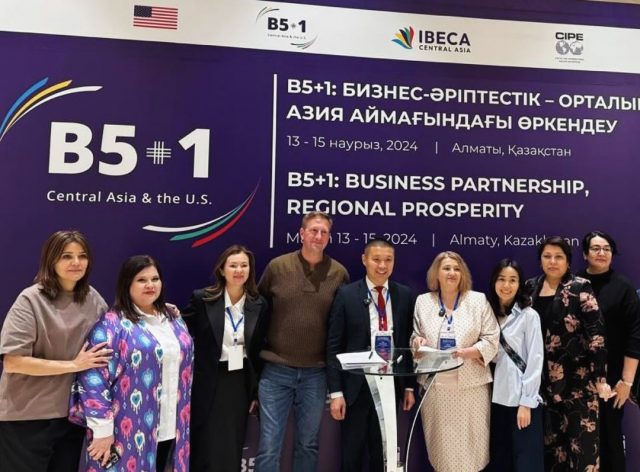 CIPE’s partner, the Association of Berry Growers of the Kyrgyz Republic has made significant strides in advancing the regional berry industry and strengthening ties between Central Asia and the United States. During the inaugural B5+1 Forum, the Association signed a memorandum of understanding to establish a Central Asian Berry Growers Association. In November 2024, it further expanded its efforts by signing a landmark agreement with the University of California, Davis (UC Davis), granting Kyrgyz farmers the rights to cultivate its proprietary strawberry varieties.
CIPE’s partner, the Association of Berry Growers of the Kyrgyz Republic has made significant strides in advancing the regional berry industry and strengthening ties between Central Asia and the United States. During the inaugural B5+1 Forum, the Association signed a memorandum of understanding to establish a Central Asian Berry Growers Association. In November 2024, it further expanded its efforts by signing a landmark agreement with the University of California, Davis (UC Davis), granting Kyrgyz farmers the rights to cultivate its proprietary strawberry varieties.
Expanding Regional and International Partnerships
UC Davis, a global leader in strawberry breeding, develops varieties with higher yields, disease resistance, longer shelf life, improved transportability, and superior flavor. These innovations will allow Kyrgyz farmers to double or triple their current yields while safeguarding crops against fungal diseases, significantly boosting productivity and income security.
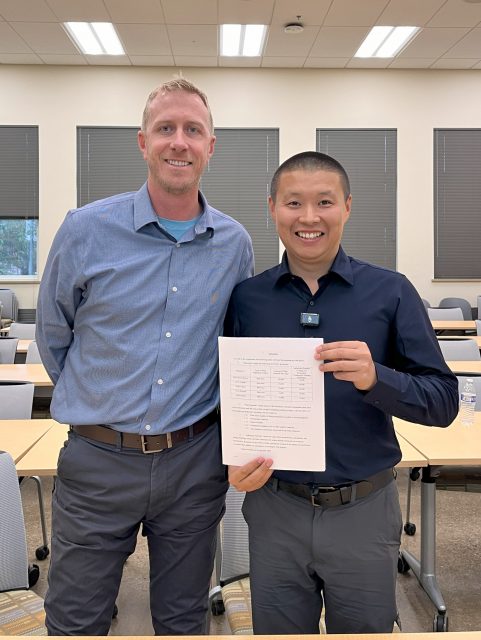 The B5+1 Forum was instrumental in forging critical connections, including with a U.S. business delegation led by Elena Son of the Kyrgyz-U.S. Business Council, which facilitated direct collaboration with UC Davis. Following the Forum, the Association organized a regional business tour and masterclasses on advanced berry-growing techniques with UC Davis experts. It also signed a memorandum of cooperation with Kazakhstan’s National Chamber of Entrepreneurs “Atameken“, further strengthening regional collaboration.
The B5+1 Forum was instrumental in forging critical connections, including with a U.S. business delegation led by Elena Son of the Kyrgyz-U.S. Business Council, which facilitated direct collaboration with UC Davis. Following the Forum, the Association organized a regional business tour and masterclasses on advanced berry-growing techniques with UC Davis experts. It also signed a memorandum of cooperation with Kazakhstan’s National Chamber of Entrepreneurs “Atameken“, further strengthening regional collaboration.
To support the local industry, UC Davis committed to assisting in the establishment of an accredited nursery in the Kyrgyz Republic, providing high-quality, disease-free planting materials at affordable prices. These initiatives reflect months of dedicated efforts to build trust and collaboration with the California strawberry industry. With these advances, the Kyrgyz Berry Growers Association is confident in its goal of achieving $1 billion in berry exports by 2030.
Policy Success: Removing Barriers for Farmers
While expanding partnerships, the Association also tackled regulatory challenges. Through consultations under the National Business Agenda, it identified the value-added tax (VAT) on imported berry seedlings as a key obstacle. With the support of CIPE through a small advocacy grant and technical assistance in developing their advocacy strategy, the Association successfully resolved the issue by collaborating closely with experts and the Ministry of Agriculture, Water Resources, and Regional Development of the Kyrgyz Republic. On November 1, 2024, the Kyrgyz Cabinet of Ministers exempted berry seedlings from VAT.
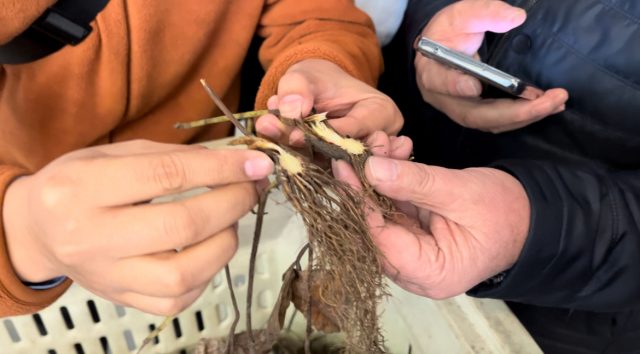 Impact on the Economy and Agriculture
Impact on the Economy and Agriculture
These developments in the Kyrgyz growing berry industry are poised to strengthen the agricultural sector by improving food security, creating jobs, and promoting sustainable growth. By reducing costs and boosting yields, the industry can transform the economic landscape and position the Kyrgyz Republic as a regional leader. The Association’s partnerships demonstrate how small investments in regional and U.S. collaborations can generate greater prosperity and expand opportunities beyond traditional areas of engagement.
This initiative is supported by CIPE through the Improving Business Environment Program in Central Asia (IBECA), funded by the U.S. Department of State.
Addressing Barriers to Tourism Growth: B5+1 Subgroup Discusses Key Findings for Central Asia's Tourism Development
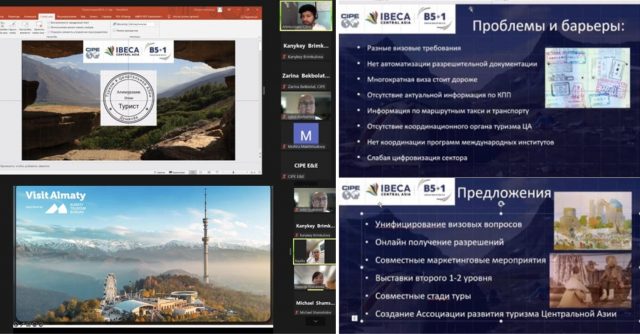 On September 11, 2024, the B5+1 regional subgroup on tourism held a virtual meeting under the IBECA program to discuss the preliminary findings of a study on tourism development in Central Asia. The study, led by IBECA expert Olimjon Alimurzaev from Tajikistan, with contributions from subgroup members, identified key challenges to tourism growth in the region.
On September 11, 2024, the B5+1 regional subgroup on tourism held a virtual meeting under the IBECA program to discuss the preliminary findings of a study on tourism development in Central Asia. The study, led by IBECA expert Olimjon Alimurzaev from Tajikistan, with contributions from subgroup members, identified key challenges to tourism growth in the region.
Olimjon Alimurzaev presented the main challenges facing the tourism sector, along with potential solutions. The study, supported by IBECA, highlighted significant barriers preventing the increase of tourists to Central Asia, with visa restrictions being one of the primary issues. These restrictions hinder the free movement of tourists between countries in the region. The study also emphasized the need to automate permit processes, recommending the adoption of modern digital solutions to streamline visa and permit applications.
The participants concurred with the study’s findings and underscored the importance of enhancing both regional and international cooperation to promote sustainable tourism growth in Central Asia.
Advancing E-Commerce in Central Asia: IBECA Subgroup Virtual Meeting Highlights
On August 22, 2024, CIPE Europe and Eurasia hosted a virtual e-commerce subgroup meeting as part of the IBECA B5+1 programmatic activities. The meeting began with a presentation by Maksat Korooluev, Senior Program Manager of the Center for Digital Economy and Governance (CDEG) at CIPE. He outlined CIPE’s strategy and initiatives to support the global digital economy ecosystem, with a focus on Central Asia. Notable speakers also included Muzaffar A’zamov, Chairman of the E-Commerce Association of Uzbekistan. 
During the meeting, participants reviewed key achievements and challenges related to the advocacy of recommendations for advancing e-commerce in Central Asian countries, as formulated under the National Business Agendas. The group acknowledged the need to intensify efforts to further develop e-commerce in the region and agreed to continue their collaboration. This includes the creation of framework agreements and strategies aimed at harmonizing legislation across the region. The participants also committed to ongoing discussions and collaboration in future meetings and forums.
Launch of the B5+1 Subgroup on Women's Entrepreneurship
On June 27, 2024, within the IBECA Program, an online meeting launched the B5+1 Subgroup on Women’s Entrepreneurship. Building on the success of the Women’s Entrepreneurship Agenda and the B5+1 Forum, as well as CIPE’s previous program facilitating women business agendas through coalitions in Central Asia, CIPE formed the B5+1 Subgroup on Women’s Entrepreneurship. This subgroup comprises women’s business coalitions and associations led by women, aiming to promote economic empowerment through regional economic integration and strengthening women’s roles in business.
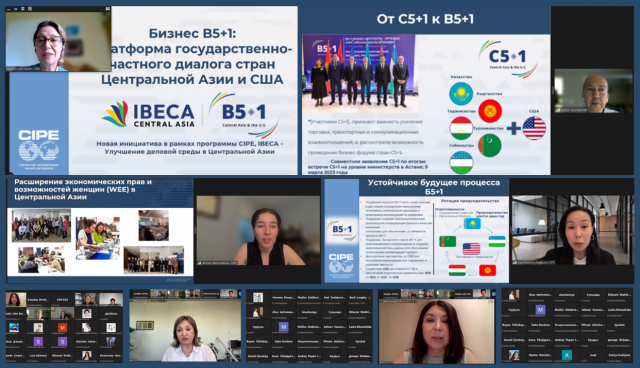
Participants discussed regional priorities and the subgroup’s agenda in Central Asia, proposed cooperation models, and necessary resources for formulating and promoting recommendations to the C5+1 governments. Over 50 participants expressed interest in holding regular consultations to address regional priorities such as innovation, digitalization, knowledge exchange, promoting women in business leadership roles, women’s entrepreneurship in rural areas, the creative and care economy, mentorship and training programs, and societal attitudes toward women’s entrepreneurship.
The meeting was a significant step towards broadening economic opportunities for women in Central Asia. Participants expressed gratitude to CIPE for organizing and supporting the event and confirmed their commitment to further cooperation and advocacy with the C5+1 governments. As next steps, participants recommended developing an action plan and thematic agenda for regional advocacy, to be discussed during monthly meetings. They also expressed interest in connecting with U.S. women in business stakeholders to learn best practices and access resources for promoting women-led business leadership through innovation and digital economy tools.
CIPE meets AmCham Uzbekistan and AmCham Kyrgyz Republic in Washington
On June 24th, CIPE Program Director for Central Asia, Sobir Kurbanov, joined a meeting with CIPE’s partners, the American Chamber of Commerce of Uzbekistan and the Kyrgyz Republic, visiting the US for the Select USA investment summit, with the US Chamber of Commerce led by Jennifer Miel, Vice President for Middle East, Turkey, and Central Asia. Building on the post B5+1 forum momentum, the discussions centered around opportunities to strengthen the US Central Asia business connections, considering Central Asia as one region representing growing interest for the US and international businesses and investors.
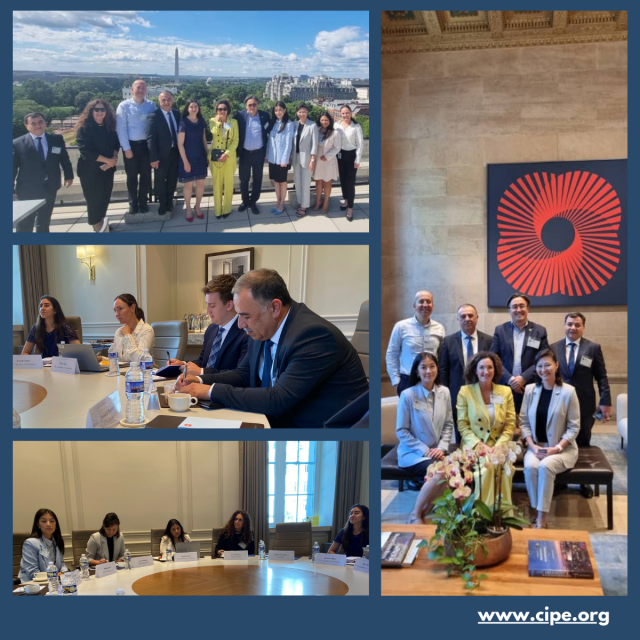 In this regard, AmChams Central Asia are emerging as leading partners representing the voice of both regional and international companies. With the latest efforts supported by CIPE, AmChams Central Asia formed a strong regional network and stepped up their efforts to improve the business environment and promote Central Asia as an attractive destination for international businesses. The latest promising developments and reforms in Uzbekistan to eliminate administrative barriers for small business, accelerate the path towards WTO accession, the investment climate has been steadily improving.
In this regard, AmChams Central Asia are emerging as leading partners representing the voice of both regional and international companies. With the latest efforts supported by CIPE, AmChams Central Asia formed a strong regional network and stepped up their efforts to improve the business environment and promote Central Asia as an attractive destination for international businesses. The latest promising developments and reforms in Uzbekistan to eliminate administrative barriers for small business, accelerate the path towards WTO accession, the investment climate has been steadily improving.
The US Chamber reaffirmed its commitment to fostering stronger business ties through ongoing B2B and B2G engagements. CIPE, as an affiliate of the US Chamber of Commerce, will continue to support these efforts under the B5+1 process.
CIPE at the CAMCA Forum 2024
The Center for International Private Enterprise (CIPE) led a panel on the “Future Vision of the B5+1 and Beyond” at the CAMCA Forum in Bishkek, the Kyrgyz Republic (June 12-14, 2024). The event brought together 215 leaders from various sectors, representing 22 countries, to develop solutions and opportunities for the region.

Moderated by CIPE’s Program Director for Central Asia, Sobir Kurbanov, the panel featured discussions with B5+1 subgroup leaders and CAMCA region experts. The focus was on the sustainable future of the B5+1 process, highlighting the role of businesses in providing innovative solutions to C5+1 governments, leveraging opportunities within the WTO framework for integration, and emphasizing the importance of women in Central Asia’s key business sectors. The session concluded with a consensus that Central Asia is stronger together as a destination for investments and international markets.
